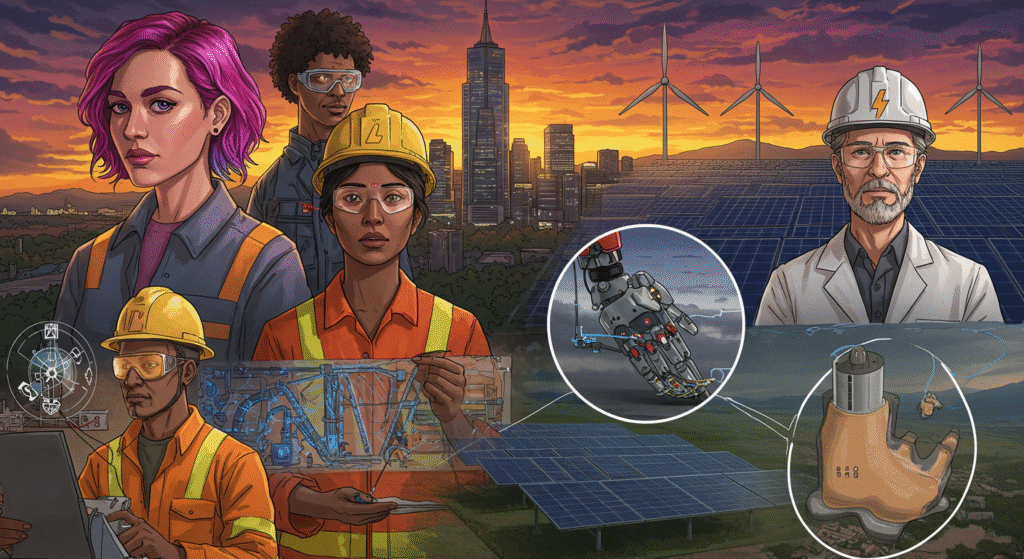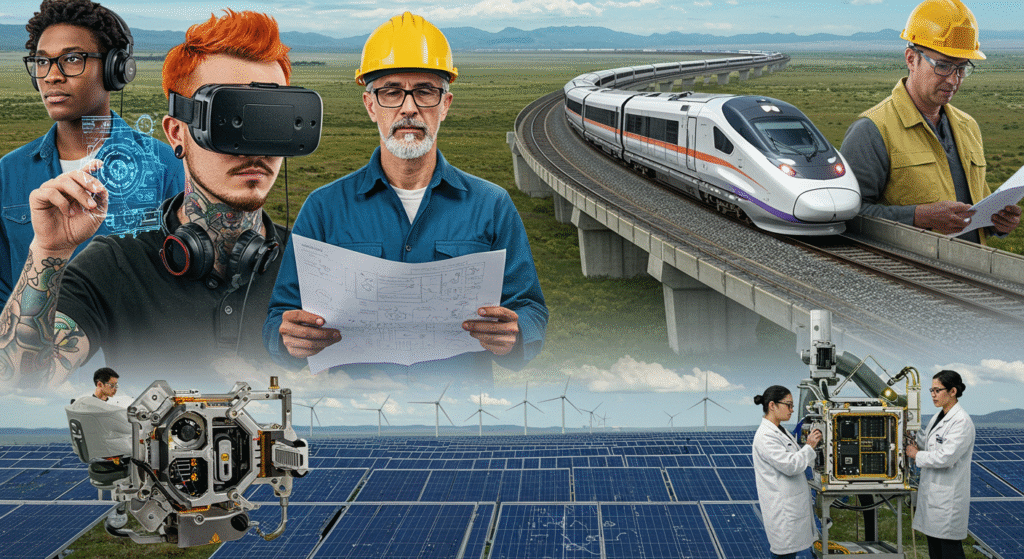The Role of Engineers in Society: A Comprehensive Overview

Table of Contents
- Introduction to Engineers and Their Role in Society
- 1.1. Who Are Engineers?
- 1.2. The Importance of Engineers in Society
- 1.3. Historical Contributions of Engineers
- Types of Engineers and Their Specializations
- 2.1. Civil Engineers
- 2.2. Mechanical Engineers
- 2.3. Electrical Engineers
- 2.4. Chemical Engineers
- 2.5. Aerospace Engineers
- 2.6. Computer and Software Engineers
- 2.7. Environmental Engineers
- 2.8. Biomedical Engineers
- 2.9. Other Engineering Disciplines
- Key Contributions of Engineers to Society
- 3.1. Infrastructure Development
- 3.2. Technological Innovation
- 3.3. Problem-Solving and Critical Thinking
- 3.4. Promoting Sustainability and Environmental Stewardship
- 3.5. Economic Growth and Development
- 3.6. Improving Quality of Life
- Challenges Faced by Engineers
- 4.1. Ethical and Moral Dilemmas
- 4.2. The Need for Lifelong Learning
- 4.3. Balancing Innovation with Sustainability
- 4.4. Public Perception and Communication
- 4.5. Global Challenges and Complex Problems
- The Future of Engineering and Its Impact on Society
- 5.1. Emerging Technologies and Trends
- 5.2. The Role of Engineers in Addressing Global Challenges
- 5.3. The Importance of Diversity and Inclusion in Engineering
- 5.4. The Role of Engineers in Policy and Decision-Making
- 5.5. The Need for International Collaboration
- Real-World Examples of Engineering Impact
- 6.1. Historical Achievements
- 6.2. Modern Marvels of Engineering
- 6.3. Case Studies of Successful Engineering Projects
- 6.4. Lessons Learned from Engineering Failures
- The Role of Professional Organizations and Lifelong Learning
- 7.1. Professional Organizations and Their Role
- 7.2. The Importance of Continuing Education
- 7.3. Certifications and Professional Development
- 7.4. Networking and Collaboration Opportunities
- Conclusion
- 8.1. Summary of Key Points
- 8.2. The Evolving Role of Engineers in Society
- 8.3. Encouragement for Future Engineers
1. Introduction to Engineers and Their Role in Society

1.1. Who Are Engineers?
Engineers are professionals who apply scientific knowledge and mathematical principles to design, develop, and maintain structures, machines, devices, systems, and processes. They are problem solvers who use their creativity and technical expertise to find practical solutions to real-world challenges.
1.2. The Importance of Engineers in Society
Engineers play a crucial role in society by developing the infrastructure, technologies, and systems that support modern life. From the roads we drive on to the smartphones we use, engineers are responsible for creating the tools and systems that improve our quality of life and drive economic growth.
1.3. Historical Contributions of Engineers
Throughout history, engineers have made significant contributions to society. From the construction of the Pyramids of Giza to the development of the internet, engineers have been at the forefront of innovation and progress. Their work has shaped the world we live in today and continues to influence future developments.
2. Types of Engineers and Their Specializations

2.1. Civil Engineers
Civil Engineers are responsible for designing and developing infrastructure projects such as roads, bridges, dams, and buildings. They work to ensure that these structures are safe, durable, and meet the needs of society.
2.2. Mechanical Engineers
Mechanical Engineers focus on the design, construction, and use of machines and mechanical systems. They work on a wide range of applications, from engines and turbines to robotics and HVAC systems.
2.3. Electrical Engineers
Electrical Engineers specialize in the development and application of electrical systems and electronics. They work on everything from power generation and distribution to communication systems and electronic devices.
2.4. Chemical Engineers
Chemical Engineers apply their knowledge of chemistry and engineering to develop processes and products that transform raw materials into useful substances. They work in industries such as energy, pharmaceuticals, and environmental protection.
2.5. Aerospace Engineers
Aerospace Engineers are involved in the design, development, and operation of aircraft, spacecraft, and missiles. They work on both military and civilian applications, pushing the boundaries of flight and space exploration.
2.6. Computer and Software Engineers
Computer and Software Engineers focus on the design, development, and testing of computer hardware and software. They are responsible for creating the technologies that power our digital world, from operating systems and applications to networking and cybersecurity.
2.7. Environmental Engineers
Environmental Engineers work on solutions to environmental problems such as air and water pollution, waste management, and climate change. They develop technologies and strategies to promote sustainability and protect the environment.
2.8. Biomedical Engineers
Biomedical Engineers combine engineering principles with medical sciences to develop innovative medical solutions. They work on everything from prosthetics and medical devices to pharmaceuticals and tissue engineering.
2.9. Other Engineering Disciplines
There are many other engineering disciplines, each with its own unique focus and applications. These include Agricultural Engineers, Architectural Engineers, Biomechanical Engineers, and Materials Engineers, among others. Each specialization plays a vital role in addressing specific challenges and advancing technological progress.
3. Key Contributions of Engineers to Society

3.1. Infrastructure Development
Engineers are responsible for designing and building the infrastructure that underpins modern society. This includes transportation systems, energy networks, water supply systems, and public buildings. Without these structures, our daily lives would be vastly different.
3.2. Technological Innovation
Engineers are at the forefront of technological innovation, developing new products, processes, and systems that transform industries and improve our quality of life. From the steam engine to the internet, engineers have driven technological progress.
3.3. Problem-Solving and Critical Thinking
Engineers are trained to approach problems systematically, using critical thinking and analytical skills to find creative solutions. This problem-solving approach is not only essential for engineering but also valuable in many other areas of life.
3.4. Promoting Sustainability and Environmental Stewardship
Engineers play a crucial role in promoting sustainability and environmental stewardship. They develop technologies and strategies that reduce environmental impact, conserve resources, and promote renewable energy.
3.5. Economic Growth and Development
Engineers contribute to economic growth and development by creating jobs, driving innovation, and improving productivity. Their work on infrastructure and technology helps to stimulate economic activity and improve living standards.
3.6. Improving Quality of Life
Engineers improve the quality of life by developing products and systems that make our lives easier, safer, and more enjoyable. From medical devices to consumer electronics, engineers create technologies that enhance our daily experiences.
4. Challenges Faced by Engineers

4.1. Ethical and Moral Dilemmas
Engineers often face ethical and moral dilemmas, particularly when their work has the potential to impact society and the environment. They must consider the ethical implications of their designs and ensure that they align with societal values and norms.
4.2. The Need for Lifelong Learning
The field of engineering is constantly evolving, with new technologies and methodologies emerging regularly. Engineers must commit to lifelong learning to stay current with the latest advancements and maintain their professional competence.
4.3. Balancing Innovation with Sustainability
Engineers must balance the need for innovation with the need for sustainability. They must consider the environmental and social impact of their work and strive to develop solutions that are both innovative and sustainable.
4.4. Public Perception and Communication
Engineers must communicate their work effectively to the public and address any concerns or misconceptions. This requires strong communication skills and the ability to translate complex technical information into understandable language.
4.5. Global Challenges and Complex Problems
Engineers are often called upon to address complex global challenges such as climate change, resource scarcity, and sustainable development. These challenges require collaborative efforts and innovative solutions.
5. The Future of Engineering and Its Impact on Society
5.1. Emerging Technologies and Trends
Emerging technologies such as artificial intelligence, machine learning, and the Internet of Things (IoT) are transforming the field of engineering. These technologies offer new tools and methods for solving complex problems and creating innovative solutions.
5.2. The Role of Engineers in Addressing Global Challenges
Engineers will play a crucial role in addressing global challenges such as climate change, resource scarcity, and sustainable development. Their expertise in problem-solving and innovation will be essential for developing effective solutions.
5.3. The Importance of Diversity and Inclusion in Engineering
Diversity and inclusion are essential for the future of engineering. A diverse workforce brings different perspectives and ideas, leading to more innovative and effective solutions. Engineers must work to promote diversity and inclusion within the profession.
5.4. The Role of Engineers in Policy and Decision-Making
Engineers have a role to play in policy and decision-making, particularly in areas related to technology and infrastructure. Their expertise can inform policy decisions and ensure that they are based on sound technical knowledge.
5.5. The Need for International Collaboration
Global challenges require international collaboration and cooperation. Engineers must work across borders to share knowledge, resources, and expertise, and to develop global solutions to global problems.
6. Real-World Examples of Engineering Impact

6.1. Historical Achievements
Throughout history, engineers have made significant contributions to society. Examples include the construction of the Pyramids of Giza, the development of the steam engine, and the creation of the internet. These achievements demonstrate the impact of engineering on human progress.
6.2. Modern Marvels of Engineering
Modern marvels of engineering include the Burj Khalifa, the Large Hadron Collider, and the International Space Station. These projects showcase the ingenuity and creativity of engineers and their ability to push the boundaries of what is possible.
6.3. Case Studies of Successful Engineering Projects
Case studies of successful engineering projects provide valuable insights into the challenges and opportunities faced by engineers. They demonstrate the importance of careful planning, innovative design, and effective project management.
6.4. Lessons Learned from Engineering Failures
Even in cases of failure, engineering projects provide valuable lessons. For example, the collapse of the Tacoma Narrows Bridge taught engineers the importance of aerodynamic design and the need for rigorous testing and analysis.
7. The Role of Professional Organizations and Lifelong Learning
7.1. Professional Organizations and Their Role
Professional organizations such as the American Society of Civil Engineers (ASCE) and the Institute of Electrical and Electronics Engineers (IEEE) play a crucial role in supporting engineers and advancing the profession. They provide opportunities for networking, professional development, and knowledge sharing.
7.2. The Importance of Continuing Education
Continuing education is essential for engineers to stay current with the latest technologies, methodologies, and best practices. It enables them to maintain their professional competence and adapt to changes in the field.
7.3. Certifications and Professional Development
Professional certifications and development programs are important for engineers to demonstrate their expertise and commitment to the profession. They provide a framework for continuous learning and professional growth.
7.4. Networking and Collaboration Opportunities
Networking and collaboration opportunities are critical for engineers to share knowledge, exchange ideas, and work together on complex challenges. Professional organizations, conferences, and online forums provide platforms for engineers to connect and collaborate.

8. Conclusion
8.1. Summary of Key Points
Engineers play a vital role in society, contributing to infrastructure development, technological innovation, and improving the quality of life. They face challenges such as ethical dilemmas, the need for lifelong learning, and balancing innovation with sustainability. The future of engineering is promising, with emerging technologies and global challenges offering opportunities for innovation and collaboration.
8.2. The Evolving Role of Engineers in Society
The role of engineers in society is constantly evolving, driven by technological advancements, global challenges, and societal needs. As the world faces increasingly complex problems, the demand for innovative and sustainable solutions will continue to grow. Engineers must remain adaptable, creative, and committed to continuous improvement.
8.3. Encouragement for Future Engineers
For those considering a career in engineering, the field offers immense opportunities to make a meaningful impact on society. By pursuing education, gaining practical experience, and staying current with industry trends, future engineers can contribute to the development of innovative technologies and solutions. With dedication, creativity, and a commitment to excellence, they can help shape the future and improve the lives of people around the world.
Pingback: Infrastructure Design and Construction